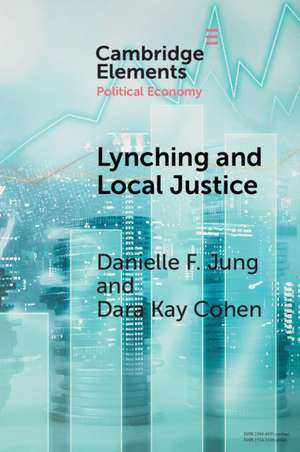Lynching and Local Justice: Legitimacy and Accountability in Weak States: Elements in Political Economy
Autor Danielle F. Jung, Dara Kay Cohenen Limba Engleză Paperback – 16 sep 2020
Preț: 144.34 lei
Nou
Puncte Express: 217
Preț estimativ în valută:
27.62€ • 30.12$ • 23.29£
27.62€ • 30.12$ • 23.29£
Carte tipărită la comandă
Livrare economică 24 aprilie-08 mai
Preluare comenzi: 021 569.72.76
Specificații
ISBN-13: 9781108794473
ISBN-10: 1108794475
Pagini: 75
Ilustrații: 11 b/w illus.
Dimensiuni: 150 x 230 x 5 mm
Greutate: 0.15 kg
Editura: Cambridge University Press
Colecția Cambridge University Press
Seria Elements in Political Economy
Locul publicării:Cambridge, United Kingdom
ISBN-10: 1108794475
Pagini: 75
Ilustrații: 11 b/w illus.
Dimensiuni: 150 x 230 x 5 mm
Greutate: 0.15 kg
Editura: Cambridge University Press
Colecția Cambridge University Press
Seria Elements in Political Economy
Locul publicării:Cambridge, United Kingdom
Cuprins
1. Introduction. Lynching in global comparative perspective; 2. Toward a theory of legitimacy and lynching; 3. Lynching around the world: cross-national evidence; 4. Local governance, legitimacy and lynching in Port-au-Prince; 5. Conclusion. Implications for theory and policy.
Descriere
This Element argues lynching emerges when neither the state nor its challengers have a monopoly over legitimate authority.












